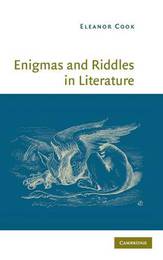
|
Enigmas and Riddles in Literature
Hardback
Main Details
| Title |
Enigmas and Riddles in Literature
|
| Authors and Contributors |
By (author) Eleanor Cook
|
| Physical Properties |
| Format:Hardback | | Pages:312 | | Dimensions(mm): Height 235,Width 161 |
|
| Category/Genre | Literary studies - general |
|---|
| ISBN/Barcode |
9780521855105
|
| Classifications | Dewey:809 |
|---|
| Audience | | Professional & Vocational | |
|---|
|
Publishing Details |
| Publisher |
Cambridge University Press
|
| Imprint |
Cambridge University Press
|
| Publication Date |
16 February 2006 |
| Publication Country |
United Kingdom
|
Description
How do enigmas and riddles work in literature? This benchmark study investigates the literary trope of the riddle, and its relation to the broader term 'enigma', including enigma as large masterplot. Cook argues for a revival of the old figure of speech known as 'enigma' from Aristotle to the seventeenth century by demonstrating its usefulness. The opening chapter surveys 'enigma personified' as sphinx and griffin, resuscitating a lost Graeco-Latin pun on 'griffin' used by Lewis Carroll. The history and functions of enigma draw on classical and biblical through to modern writing. Wide-ranging examples concentrate on literature in English, especially modern poetry, with three detailed case studies on Dante, Lewis Carroll, and Wallace Stevens. An important contribution to studies of poetic thought and metaphor, this anatomy of the riddle will appeal particularly to readers and scholars of poetry, modern American and comparative literatures, rhetoric, and folk-riddles.
Author Biography
Eleanor Cook is Professor Emerita, Department of English, University of Toronto. She writes mainly on poetry and poetics, especially modern, as well as on questions of allusion, the English Bible and literature, and the riddle. Her books include studies of Robert Browning and Wallace Stevens, as well as a collection of essays, Against Coercion: Games Poets Play (1998). Her essays have appeared in many books and journals, including American Literature, Daedalus, ELH, Essays in Criticism, and Philosophy and Literature. She has served as President of the Association of Literary Scholars and Critics, and is a Guggenheim Fellow, a Senior Killam Research Fellow (Canada Council), and a Fellow of the Royal Society of Canada.
Reviews... a brilliant chapter on Lewis Carroll and the Alice books... A useful new (or old) coinage, griph (as in logogriph), is proposed for such pastime puzzles, which might be useful in particular for those interested in children's games. There is another section covering 'innocent amusement' and 'other functions of enigma' that is also of direct relevance to folklorists... A short review cannot do justice to the meticulous scholarship of this work. Katherine Knight, Folklore ... a great contribution to the theory of literature and a new lens on Stevens... Cook presents exactly what has been missing: a rich study of riddle and enigma from classical literature to the present... enormously suggestive and will, no doubt, inspire future studies. Now that she has shown us the designs that literary riddles and enigmas take, we might use her theoretical types to open up the more puzzling aspects of a particular poet's work. Lisa Goldfarb, Wallace Stevens Journal "... this beautifully organized and detailed analysis ... informative case studies on Dante, Lewis Carroll and Wallace Stevens ... she defines terms and provides a wonderfully wide range of examples from Aristotle to Josephine Tey. Thus, both the topic and the treatment should have wide appeal... Highly recommended. Lower-division undergraduates through faculty." - Choice "Eleanor Cook's magnificent book ranges widely across the territory and goes a long way toward her goal of making up for the lack of explicit attention from literary critics and tehorists in recent centuries. Unlike the answer to the Uraon riddle, her book comes with open hands, linking a wealth of references and ideas without trying to reduce them to a Procrustean bed of argument." - Curtis Gruenler, Hope College, Christianity and Literature "As Eleanor Cook points out in this original study, riddling illuminates the greatest mysteries through the smallest things... Her mission is twofold: first, to rehabilitate the riddle as a significant literary device, and second, to bring back the discipline of rhetoric... A late poem by James Merrill ... receives a brilliant and enjoyable decoding here ... the ancient discipline of rhetoric might be due for a comeback... as Cook points out, when Shakespeare went to school ... he was probably taught how to declaim and blazon and vituperate, and how to perform other versatile acts of rhetoric, such as punning, fooling and riddling, and the instruction would stand him in good stead... In an era when lovers of books want to write far more than they want to read ... the old tools and methods of the rhetor's art might be worth dusting off." Marina Warner, London Review of Books
|